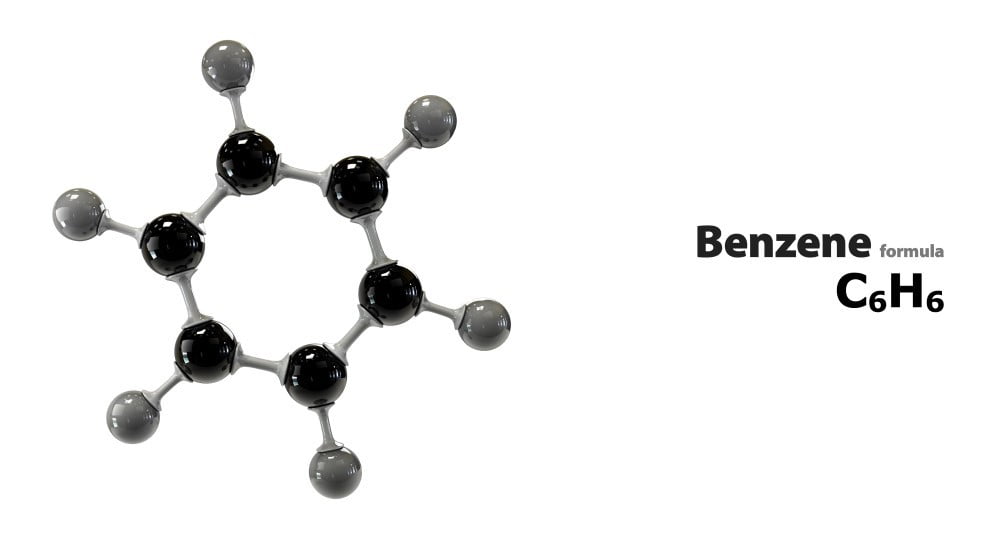Among Healthscreen UK’s extensive range of services is that of Benzene monitoring. So, what exactly is this strange substance and why should you look out for it?
What is Benzene?
Benzene is a colourless or light yellowish chemical compound that is a liquid at room temperature. It originates partly from southwest Asia, where a resin that was known as ‘gum benzoin’ became popular with Europeans in the 16th century. Pharmacists in Europe derived from it an acidic material deemed ‘flowers of benzoin’ by a process of sublimation.
However, it wasn’t until 1825 that benzene was first isolated and identified in its pure form. The celebrated English scientist Michael Faraday used the oily residue derived from the production of illuminating gas and gave it the name ‘bicarburet of hydrogen’. In the 19th and early 20th centuries, the compound was used as an aftershave lotion due to its sweet, pleasant smell. Later, prior to the 1920s, it was used as an industrial solvent, particularly in the use of degreasing metal. It has also been used to decaffeinate coffee, as a paint stripper, spot remover and for many more besides.
It can occur as a by-product of coke production, and trace amounts can be found in petroleum and coal. In total, four chemical processes can result in industrial benzene production: catalytic reforming, toluene hydrodealkylation, toluene disproportionation and steam cracking. It is generally used as a means by which to make other chemicals, often in order to make polymers, plastics, rubbers, lubricants, dyes, detergents, drugs, explosives and pesticides.
Benzene molecules have even been detected on Mars, as it can be formed in volcanoes.
Why is it Important to Look Out For?
Up until the 1940s and early 50s, the health affects of benzene were not well-documented. However, after a study from the American Petroleum Institute (API), they found that it was extremely harmful. Indeed, their study concluded that ‘the only absolutely safe concentration for benzene is zero’. No safe exposure level exists, and even trace amounts can cause harm – not only is it a carcinogen (causes cancer) but it can also cause bone marrow failure, which occurs when people produce an insufficient amount of red blood cells, white blood cells and platelets.
Both combined can result in a number of catastrophic and terminal diseases, ranging from Fanconi amenia to dyskeratosis congenita to leukaemia. Since it is often found in hydrocarbon and gasoline fuels that are ubiquitous in modern society – in the US, it ranks among the top 20 chemicals for production volume – the exposure of humans to benzene is a worldwide health issue. In addition, it can target the liver, kidneys, lungs, heart and brain and even cause damage to DNA and chromosomal damage. Animals, too, can contract cancer from it, making it one of the most harmful substances around.
How Might I be Exposed to Benzene?
There are several (surprisingly common) ways in which you might be subjected to benzene exposure. If you’re outside in proximity to tobacco smoke, petrol stations, engine exhausts or industrial emissions then you could be exposed to the chemical, although generally it’s more of a risk indoors. Glues, paints, furniture wax and detergents are all important factors to look out for if you are operating in an enclosed space. Similarly, underground storage tanks and hazardous sites nearby which can contaminate the water are potential causes of exposure to benzene.
What Are the Symptoms of Benzene Exposure?
Those who breathe in a sufficient level of benzene may experience the following signs and symptoms:
- Headaches
- Tremors
- Drowsiness
- Dizziness
- Rapid/Irregular Heartbeat
- Confusion
- Unconsciousness
Eating or consuming benzene can result in the following:
- Dizziness
- Sleepiness
- Vomiting
- Stomach Irritation
- Rapid/Irregular Heartbeat
- Convulsions
It should be noted that in either case, prolonged exposure can result in immediate death at a high enough dose. If someone has eaten or drank something with a high level of benzene, then it’s also possible that they may inhale any vomit back into their lungs, which in turn causes serious breathing difficulties and continual coughing. Likewise, if the chemical receives any direct contact with the skin, eyes or lungs, then you can expect substantial tissue damage.
How Can I Protect Myself From Benzene?
If you are working in an area with benzene in the air, then the first best practice is to move elsewhere to get fresh air. If you’re outdoors, move away from the initial area of release; if you’re indoors, you must evacuate the building.
Otherwise, if you think you have been exposed to benzene, then take the following steps:
-
Remove Your Clothing
Any clothing that may have exposure to benzene is a risk. Take it off immediately, avoiding contaminated areas. Any item which needs to be pulled over your head should be cut off instead.
-
Wash Yourself Thoroughly
You must wash yourself quickly and carefully with soap and water. If your eyes are affected, then you should rinse them for 10-15 mins. If you wear contact lenses or spectacles, then you should take them off beforehand and fully rinse them too.
-
Dispense of Your Clothing
Once completely clean, you should place your clothing inside of a sealed plastic bag, avoiding any potential contaminated area, along with any other affected item. When emergency services arrive, you should tell them exactly what you did with your clothing and items. Bear in mind you should never handle the bag again after sealing.
-
Contact Emergency Services
It is imperative that someone around you or yourself (if absolutely) necessary get in touch with emergency services immediately.
If you are concerned that you may have been exposed to benzene for a considerable amount of time, then don’t worry: We at Healthscreen UK are able to provide a variety of benzene screening methods to ascertain whether or not you have been damaged by it.
Click here to book an appointment today to get in touch if either you or someone you know has been affected: contact us.







